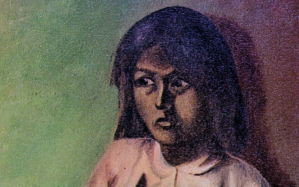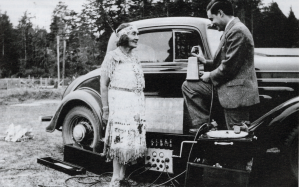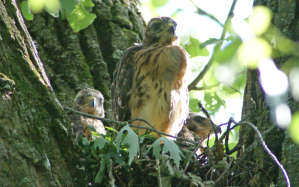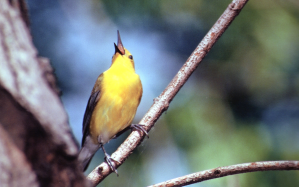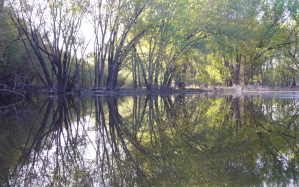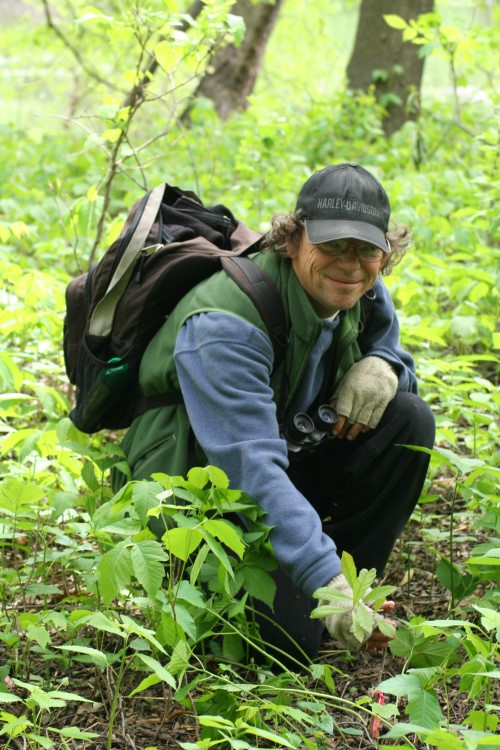(Copyright 2012 by Richie Swanson)
Bancroft Library listed Salvaging in Finding Aid to the Frontiers: A Journal of Women’s Studies Records 1972-2012
A window crashed apart, and fire leaped through the shards, leaped up the frame, and I waited behind Auntie, watching through the doorway as little flames raced across the front-office floor, and she bent to her switchboard, talking to Philo’s Landing. “Bandages! Ointment! Doctors! Come on the north highway! Bridges are burned on the east!”
Chunks of fire dropped from the ceiling, and Auntie cranked her magneto, calling Marshfield, and the second board rang–Nathan Gearhardt in college in Salem asking about Queen Anne’s Hill.
“Every house burned up there,” I told him.
“Ellie, do you know my father’s Plymouth?”
Flames licked chair-legs across the room, and I lied to hurry him off. “I saw your dad driving it to the river with your mom and sisters!”
A wall slumped, and we grabbed insurance papers, ran out the building and hedged on hot-cracking concrete. Flames towered from roofs across the block, roaring from Tupper’s Hardware, Moore’s Drugs, the Oregon National Bank. We ran toward Main, and Auntie steadied me, jerking my wrist. Just before I had run to the phone company, Valerie and I had been watching Errol Flynn, The Charge of the Light Brigade, and now flames spewed from the theater, the pool-hall window crashed next door, and Jack Groslius jumped out, hugging his cash register to his chest, his pants-cuffs on fire.
We beat them out, got in his pickup, drove Second Street to Front, and we saw Valerie’s mom pulling a hose from the river, her dad spraying their cinder-block station with a piddling mist, her brothers beating gunny sacks against popping-sizzling gorse. And Valerie was running around the gas pumps, kicking burning boards, and I shouted as we passed, but fire was roaring all around, ripping air, booming like a monstrous gorge, a hell about to explode.
Groslius drove Riley Beach Road to the turn to our house, but snags burned across it, and fireballs shot from pines on both sides. Groslius hunched sweating over his wheel, his face lit to its deepest lines, and I had never been so near him, would never have talked with an arcade owner, you know. “I’ll bury my register here, then I’ll drive you through!” he shouted. “I’ll drive you to your house!”
“No!” cried Auntie, burn-holes everywhere in her backstitched jacket, her eyebrow-paint a melted mess. I opened my door, determined to go in by foot, because Auntie had made me her own after my mom had died having me sixteen years ago, and I knew her parents had built her house sixty ago, using timber from a wrecked lumber schooner. Auntie stiffened. She gulped against it, and Groslius sped toward the beach.
We passed the last of the creamery, a blazing skeleton of brick window-holes and twisted-glowing machine shapes, and Groslius stopped at the end of the road, right behind cars sunk in the sand, packed with belongings. He took up his shovel to bury his register, and he waved us toward Missus Hafferty and her kids climbing South Jetty, and we ran across the rock wall, and a sailor rowed us across the river.
We got out, and all kinds of horns went off behind us, shorting out, and I thought Groslius was signaling that someone had seen our house okay. But I turned to a battery of blasts, cars’ gas tanks, and Groslius stood on the jetty, raising a moonshine bottle in a pulsing red glow. He had come from French stock, was most always blessed with a devil’s smile, and he took a long, long swig, and Auntie watched him, wiping her lips, smudging them with ash. “Home’s gone, all of it,” she said.
We raced along the sand ruts of Na’ah Beach Road with hundreds who had been ferried from the town wharf, everyone talking about getting to the Jameson Hotel out on Riley’s Rock, everyone carrying something, a gal with microphones from a dance, a slicker with a jazz horn, Mister Staines with his rifles, Missus with a potato sack of table silver.
Little Cindy Hafferty ran to her dad squirming above the surf, and Missus Hafferty knelt over him, mumbling prayers in her brogue, and he groped at her face, his eyes blotted and bloody from cinders. “I kin-naught see ye, Lydia, not any a’ ye!”
Auntie tore open his shirt, and his chest bubbled red, shiny like kelp-juice, and he moaned, and I lit out, nearly stepping on a mom and boys buried to necks in wet sand, cooling scorched skin.
The whole world smelled of burning trees, the waves sprayed sickly and warm, all of the sea-sky was a haze reflecting hideous heat.
Driftwood piles were burning, but the pines on North Seal Dunes east of the beach hadn’t caught yet, so I thought maybe the South Seal Dunes hadn’t either, and everything past our bridge on Alder Creek was still unburned. I climbed Na’ah Rock, a solitary beach rock one-hundred feet high, and I got to the wind-blown spruces on top, to the low-sprawling trees that had been my old hiding haunt–the old green cave–the pretend house Valerie and I had tested our eagle-eyes from, looking down the beach and across the river-mouth and clear to the dips in the South Seal Dunes where sometimes we had seen whirlwind creatures, and most times Auntie’s chimney. But Auntie was right. The fire burned all around South Seal Dunes, and nothing remained of town but Smith’s Station, the mill and cold decks at the river bend, and the Giant Red Demon was still coming down the Seal’s valley, still leaping crowns inside timber-smoke, finding new fuel along the Seal’s banks.
Oh, the wicked thing.
I sank down on hummocks, and pangs made me weak–Joey Morgan and I had tongued kisses here last month, and he had popped girdle-snaps, had found me wanting him, and I had socked his gut good, and he had shoved me away. He had stood cussing, his cheek-muscles cable-tight, and I had sat firm on the grass, drawing my skirt-hem back down to my ankles, and then he had gone off, glaring at town, and he had been nowhere since.
But this evening I had left Auntie’s porch, and the sun had been shining red and hot through forest-fire smoke, and I hadn’t hesitated. The sun had looked that way a few times last summer too, and anyway I had walked to Valerie’s house, thinking the scorching bleeding ball was the color of our hearts in our dimmest haze, Joey’s and mine, and I had felt all fluttery inside, hoping he would be at the show, and we’d sneak off, and I’d be out of school by Thanksgiving, kissing him proper in one of the mill’s cabins, married! And then the show had started, the theater-lights had come on, and Fire Chief Dawson had announced he needed men, and Joey had stood in his high-collared jacket five rows in front of us, and he had plunked a smooch on Julie Bullard’s ruby lipstick, fingering her bleached hair before he had gone.
And now I knew I was dumb and girly to be off alone, feeling Joey strong, and I couldn’t think if he was trapped against some pump truck or inside a backfire or what.
A stare on my back! A starving man sat just above me, tucking his knees to his chest in the old spruce-cave, his face a weak creamy brown in the fire-glow, his stare gunky and squinty and black, then coppery and shiny, then a deep-pooly brown like it had been taking me in since I had begun to walk up the beach. Half-hacked hairs hung from his chin, and he seemed as old and silent as Na’ah Rock herself, no shirt on, plenty of bone showing, nearly no breath, his pants and boots beat-up.
He showed sorry bits of gray-yellow teeth, looking off. Everyone yelled from the river-mouth. The Red Demon flared offshore–the Jameson Hotel and its stairway on Riley’s Rock had caught from firebrands, and walls dropped flaming to the dark water.
The bony-brown man said something toothy, and I edged my way up, and he said the name slower, and it still had too many hard letters to understand. “Tttlattnnittnk.”
I looked at him disbelieving.
“That’s Creator Rock,” he said in English. “The first seals came out of there, the first salmon, the first birds, the first people.”
I had a fright, a jolt of meanness, and I raced down Na’ah Rock onto the sand again, and a deer snorted, leaping a drift log, fur on fire, and shadows raced through wood litter—rats–and cows lowed in front of the surf, and I smelled dung close, Julia Moore the druggist’s daughter squatting against the rock.
* * *
All of town crowded the beach all night.
The wind changed, the fire and roar finally ceased, sea dampness crawled through clothes, and the sun rose as it had set, red and bleeding again, glaring through smoke dark as stove soot.
No Sunday bells. No churches. No birds singing.
Waves swept in dull and heavy, and men shouted sudden, wading in, dragging out bodies of maids, cooks, tourists.
Auntie and I caught a boat back across the Seal, and our shoes squished and sucked through boiled Chinook as we climbed the jetty.
State troopers allowed us through a blockade, and we walked hand-in-hand, our soles crunching charcoal from Nordstrom’s house and barn, the stink of their sheep singeing our breathing. We got to the top of our hill and looked down, and our chimney stood all by itself, and Auntie dropped to her knees, and I knelt, and she pushed me away and clawed the blackened road. “You saw the fire, Ellie! You left the house! You knew the wind! You walked right past the office and into the show! How, Ellie, how? You had that bucker on your mind, the way he pretends to look at you! Lord knows I would have done the same! Town on fire–”
“Not yet, it wasn’t!”
“I would have dropped everything to find Leo—to save the house.”
Leo her husband dead from the flue years before she had taken the train to the orphanage to get me.
Damn me, I thought, and I made my way toward the chimney, walking through the charred gate posts to the charred cement step, but rubble glowed like morning coals, searing me, and I turned, and Auntie was still kneeling, raking her hair, and her glare leaped vicious at me.
I killed her sister when I got born. And now I got so dizzy over a two-timer I let her house burn.
I walked downtown, and chimney after chimney stood black amid tubs, toilets, twisted pipes, iron bedposts, mounds of melted glass, and Smith’s Station was nothing but blown-up gas barrels and busted blocks, and a gray-bloused figure rose from rummaging, sucking stringy-black hairs against a black cheek. Valerie! She whooped and whistled and squeezed me and said the first barrel had exploded behind the station, warning her family. “Is Auntie all right?” she asked. “Joey just went to look at a body, you know–Julie Bullard’s dad, they think.”
I pushed it off, all of it, as much would go.
“They need you over there, Ellie.”
Soldiers were stringing an emergency line, putting up tents, and a sergeant pointed me into one that had an old ten-drop switchboard on a fish crate, and a slicker stood from hooking it to a battery, smiling cautious. “Are you the operator’s niece? The one who stayed making calls with her?”
His teeth looked rich, his cheeks broad and sun-bronzed, and he was all blond, all snappy in a brown-worsted vest and starched shirt, and his hair-part was dry and wind-fluffed, smelling of fancy-Dan tonic through the smoke stench, and his eyes lifted slow and curious like a mama doe’s, and they didn’t even look college-aged, his baby browns, not even soldier-aged.
I sat on a log behind the switchboard, wrenching my face at him, and he slid a second battery beside the first, hitching his shoulders like he was some kind of hero.
“I had them in my roadster for my eidophone,” he said.
He had a convertible? And a phonograph machine? But no food or drinking water or medicine?
“I showed the two nine-volts to the sheriff up in Marshfield, and he gave me the switchboard to drive here,” he said. “I brought a man from a breathing camp, and we hauled snags off the highway all night.” He sat on the log opposite the board. “I need to call Washington D.C., Doctor George Peabody Pyle.”
“Two minutes.” I gave him the candlestick phone reluctant. “The sergeant says that’s all, especially if it’s not real kin.”
“I might need more,” he said. “Doctor Pyle’s at the Smithsonian Institute, but he really should be here.” The slicker lit up his eyes, looking serious at me, gripping the candlestick like an old friend. “I grew up next to Doctor Pyle in Berkeley. He moved next door to my mother’s house when I was five, and he used to see me sitting outside on Mom’s stoop, and he would come over and pull harpoon heads, wedges and scrapers out of his pocket. And so I chiseled rocks, and I got good at making old stone tools, and Doctor Pyle would laugh and name them in all kinds of languages–Apache, Maida, Chumash, Modoc, Wintu, Paiute, Pomo, Washo, on and on. Mom would take in his washing and sewing, and then some mornings his Model T would just be gone. He would be away in the field for months, but now he’s stuck at the institute and has me in the field driving all over creation, interviewing Indians! He wants me to go to Columbia University!”
I cranked Portland, and Portland got him through, and he leaned forward like a horse-race rider, holding the earpiece to his head, listening, his neck swelling all-proud against his collar. I watched the acid timer testy, and then he said the toothy word real slow to his professor. “Tttlattnnittnk, yes, I’m here, but I’m supposed to be at the Siletz Reservation tomorrow to finish with Old Koquille. Old Koquille says he knew birds when they were people, and he sees ghosts on the beach!”
“No, Andy!” His professor shouted through the line, and Andy listened on, and I unplugged the jack at two minutes, and he stood and shook my hand, his fingers feeling silky and flowery, not like they had moved any snags at all.
“Thank you, miss, you don’t know Doctor Pyle,” he said. “He trusts me, but if he thought I was in the wrong place, missing an interview, he would lose his wits. He said fires sometimes flush hide-outs from the woods, and I might meet some Indian we never knew existed. Do you know any Indians around here? Have you seen any?”
I wrenched my face again, and he bowed gracious, and I escorted him to the door-flap, my skin bolting hard, my insides flaming raw, my mind still seeing the fire swarm South Seal Dunes from Na’ah Rock.
He walked to his red convertible, and burns dotted its white-rubber top like maybe half of what he said was true, and then the switchboard started to ring, and I pinned messages outside on canvas with army-issue pins.
* * *
Missus Bullard came in and called her father-in-law, sobbing, and Joey and Julie stood behind her, squeezing her shoulders, Joey’s cheek-muscle sinking solemn, his eyes fogging at me.
The maids’ husbands made calls, notifying relations.
Thirty-three dead so far from Jameson’s, twenty-four in town.
Auntie came in tight-lipped, and she nodded me up and gave me a plate from the mill, steaming bread and red-sweating sausage and applesauce, and she sat in an oversized coat, handing me a requisition slip for Red Cross clothes.
“Auntie, I should have stayed at the house and rung you!”
“No, you would have burned!” She looked up with eyes as blue as a jaybird, crying. “I would have lost you! We did our best, staying in the office, didn’t we?”
A bell rang, and she glanced blinking at the ten-drop board and saw what I had only begun to remember. The same model had sat just outside our kitchen before Pacific Phone had built its Seal City office, and Auntie had put a play box beside it, had hung bells on the cardboard, had punched holes for wood pegs for jacks, had fixed up a can and string, so Little Ellie had taken calls too.
And now Auntie grabbed the earpiece from the candlestick, and she curled her finger the same way she had whenever she had made the receiver-hook go click-click-clack, whenever she would say quack-wack-wack, waving her nose like a duckbill, warning me I would be a dead duck if I ever eavesdropped.
She short-handed the message, and her eyes glistened moistly at me as I went out, and I walked to Red Cross, hearing Little Ellie and Auntie chiming the company’s vow and our own secret verse together:
“All Pacific Phone ladies
keep all their lips sealed,
the quietest phone operators
in the telephone field.
But Ellie Duck and Auntie Duck
keep Seal City sealed,
the truest phone family,
with no quacking to yield.”
I found and put on an old dollar dress with an embroidered collar, and a hip-hugging sweater, and then I walked along Front Street, hunting a shovel to dig for our moneyboxes, and then a tapping came furious at me, and there was the roadster parked with the top down, Andy banging at a typewriter propped against his steering wheel, his cheeks smooth and soft and glowing, his hands possessed and believing, his smile talking to itself in some far-off world. He pulled a three-by-five slip from what I would learn was a language machine, English keys pounding out Penutian words, and he filed the paper in a little metal box, and somehow I saw him different, his face as bright as a polished pearl in the dirty-ashy air, his fingers leaping like gleaming surf-spray. He looked up, and he brightened the street, the town, the whole world, and I nodded half-friendly, my tongue nearly tied. “I think I saw you your Indian,” I said.
A log barge ferried us across the river, and Andy drove Na’ah Beach Road, staring back at Queen Anne’s Hill. “Jesus, it looks like the last war, like pictures of a bombed-out city in Europe!” He glanced at soldiers walking the river-mouth, and he turned the roadster up the tide wash, and he looked at the charred slope of Nesi’ka Head, talking a blue streak, almost giddy. “Doctor Pyle says, `The flood is rising, Andy! The native languages will be washed away, swallowed by tuberculosis!’ Doctor Pyle thinks two language families might have met right here, that there was a tall white driftwood pole four or five miles past that headland–a boundary marker!” Andy eyed me keen. “Doctor Pyle thinks people here spoke Seal, Athabaskan, and maybe Hanis and Miluk, Penutian too! Maybe!” He braked late for a cowherd, honking, and the cows swung around, bunching together—they shied from smoldering driftwood on one side, breakers on the other–I got out and hollered, waving my arms, raising and shaking my tail, feeling Andy watch.
I climbed Na’ah Rock ahead of him, holding my hope quiet, feeling my legs thick and boyish beneath my dress, my manners coarse, but Keekwillie was there, lying deeper inside the tree-cave, his face barely out of his bedroll, and Andy knelt easy, putting down a can of peaches and a sausage, but Keekwillie tucked his elbows beneath his chest and watched a horse-soldier riding along the surf, searching waves with field glasses.
I sat beside Andy beneath Keekwillie. “You got what you need?” I asked. “They’re giving away food and clothes in town.” Keekwillie kept watching the soldiers. “I saw you last night,” I said. “I saw Andy this morning. He said your word.”
Andy nodded toward the smoke-haze in front of Riley’s Rock, saying how he had come to drive Doctor Pyle’s car, how professors knew only one word in the whole Seal language, how the language could live forever on a phonograph.
“Tttlattnnittnk,” said Andy.
“You’re too young,” said Keekwillie.
“Seventeen,” smiled Andy.
Keekwillie laughed sharp, reaching deliberate for the peach can, sores and scabs on his arms, a rotten smell like cancer. He worked a log-camp knife around the can’s rim and swigged the juice all at once like Groslius and the moonshine, his Adam’s apple a pecan pushing hard and pointy against his throat.
He slurped the peach halves and glared gunk-eyed at Andy. “If I tell you Seal words, maybe I’ll drown. Maybe you’ll drown, maybe she will. Maybe I’ll lose my voice, and I’ll die and search for it forever.”
But Andy took out a couple dollars, Keekwillie folded them into his palm, and Andy handed me his professor’s notebook, moving his cheek close to mine. “Will you take shorthand?”
“Sure, I will!”
Andy pointed at his head, hand and arm, at beach rocks and landmarks on the river, and I wrote the names Keekwillie gave them, making triple consonants when Andy wanted, feeling his looks deep and bright, his cheeks flexing strong, and then the tide went down, and the horse-soldier rode out between charred timbers, and he hoisted a dripping body behind his saddle, and Keekwillie swallowed a gulp as thick as sand.
“I pulled out a mother,” he said, “my second mother—Na’ah Lang.” He checked a look from Andy, glaring again. “That was her white name. The soldiers made it from the trade language when they came down the valley. They swept this valley clean as this fire. They burned lodges all the way down. I was just a boy, so my first mother sent me to hide up here, and when the soldiers got Na’ah Lang on the beach, I saw them swing their swords. They cut her up like a cannery fish and took everyone else away, and I picked up her pieces, picked up a dead brother and grandmother too.”
“Eighteen hundred fifty-six,” said Andy, “Saghilli’s village.”
“Your professors knew two Seal words,” said Keekwillie.
“Doctor Pyle was never sure `Saghilli’ was really Seal,” said Andy. “He said the whites killed Na’ah Lang after she cut out a lieutenant’s heart with a razor clam.”
“I was here on this rock when that lieutenant pointed his pistol and marched her into his tent the night before,” said Keekwillie. “I grew up working logs on the reservation the other side of Crater Lake. I spoke Klamath and English, but I never learned anything much different about white men and Indian women.”
“You remember Na’ah Lang’s name in Seal?” said Andy.
Keekwillie grunted, and Andy let him have his silence, and I snuck a gaze at the soot-cloud hiding the South Seal Dunes, our chimney, because I knew Auntie worked in the tent without relief, and this century wasn’t so different the last, police couldn’t guard everything for everybody.
“I almost sold some things to a museum once,” said Keekwillie. “I got a trunk buried, shell-money strings, a ceremony dress, a hyme-hyme, basket caps, woodpecker crests.” He labored to turn his head toward Nesi’ka Head, brushing against the spruce-cave. “Twenty dollars, I’ll show you. The tide’s still low enough you can drive your car.”
Andy paid and then lifted Keekwillie gentle, helped him put on a hole-ridden mackinaw, and he tied Keekwillie’s boots, leaning full into the cancer smell, afraid of nothing. He kept hold of Keekwillie stepping half-blind down the rock, and he tucked a blanket around him in the front seat of the roadster, and I thought of Auntie again, the switchboard, and then Andy pressed fingertips against my back, guiding me into the rumble seat, and I sat tingling beside the eidophone, bound to catalogue my first artifacts.
Andy drove up the beach, following jeep ruts, and we started around Nesi’ka Head, the tide-mud slapping loud, the wind blasting cold, and Keekwillie shouted, “Farther out! Too many rocks close in!”
What rocks? I wondered, and Andy swerved, and I flew cockeyed, things battering me, the seat slamming my back, bucking. It stopped. The engine gurgled and died. The car was stuck, leaning, and I got up, and I fell.
I plunged bosom-deep in a tide-pool, and Andy was in it too, flailing, spitting, and we climbed slipping on seaweed, and the roadster was still there, one tire with muck oozing through its spokes, another hanging off a rock. Keekwillie wobbled up in the front seat. He leaned into the back, grinning skinny-toothed. He grabbed the metal boxes, the files of Andy’s interviews. He tossed them above us, aiming them everywhere. He tossed phonographs everywhere–books, papers, the microphone, speakers, the notebook, and then he pushed spry out his door. He walked nimble, his shoulders lurching with victory, and he dropped the blanket in tide sand and stepped around Nesi’ka Head, not looking back, and Andy cussed, splashing, fishing things from water, and I braced a shoulder against the roadster, shoving, and it didn’t budge. I ran to a drift log, wanting to pry the back tire, and I looked, and Andy was nowhere, and a wave slammed against the roadster, and then it swept backward, and the car tilted and slid into the tide pool. The big bug-eyed cowl lights went under, and Andy screamed, hauling himself up from a kelp-tangle, sleeves drenched, skin purple with cold, and I ran to him, and I hugged him hard, each of us just gasping.
“Jesus, Ellie!” Andy stared helpless at the tide pool. “Doctor Pyle! His car! Our files! His roadster! His work!” Andy moaned mad at himself, shivering. His face bit down on itself, and the sun slipped sudden beneath the smoke-haze, pulsing pink from an electric-violet horizon, and his cheeks clenched gold, flooding rose, and I reached to him like Joey would me—except I trembled, seeing my breath on his cheek, and I finger-tipped him, cupping my touch like Auntie would, stroking him, knowing to take command like Auntie.
I led Andy by an elbow, picked up Keekwillie’s blanket, tucked us out of the wind against the headland, and I blew on smoldering driftwood and stacked on pieces, and Andy paced beside chin-high flames, still shivering, dripping. “God damn me!” His lips fluttered, his teeth chattered, he shook all over. “What a fool I am! A trunk buried! A museum! Jesus!”
“Andy.” I took his hands. “I’ll turn away. You take off your clothes. Put yourself in this blanket, or you’ll shiver to death.”
“Doctor Pyle got this blanket from Missus Sherman Manygoats, Two Grey Hills, Navajo! Trusted me with it!”
“You have to take off your clothes, Andy.”
“Doctor Pyle—“
I unfastened his vest-buttons, his doe-eyes watching, comprehending slow, and I draped his vest against the headland, and finally he took off the rest, and I peeled down to my underclothes, facing the rock, my crotch hair drenched conspicuous against Red Cross bloomers, my nipples showing against my brassiere. I turned, and Andy sat on a blanket-corner in city-style drawers, tight and revealing, and he stared off, rubbing ruddy-purple legs, and I plunked myself down beside him, and I put an arm around him, and he slumped, burying his face above my brassiere, and I lay back, tugging him close, and I bled on him before the night was done, giving him all I wanted, all I thought I had left.
And afterward we slept, and I woke with his hair damp and sandy and silky on my face, his chin snug my shoulder-bone, and I eased his head down, and I got up and tiptoed from the little-low fire-glow, not hurting so much, just feeling him every move, figuring Auntie would know soon as she saw me. I took my dollar dress from the rock, and I slid it over my head, and Andy woke before it was all the way down my legs.
“Ellie, you leaving without me?” He sat up, pulling the blanket across his lap. “Can you wait? Help me tell Doctor Pyle? Give me more than two minutes?”
He turned his back, dressing, and he slung his arm around me, walking the beach toward town, and we still walk it today. He’s my mister, you know, and I’m his missus. We taught at a university thirty-five years, bringing Seal Indians to graves, examining remains with sound, heat, computer pictures and ancient stories, no digging anymore.
We always knew Keekwillie had given us the most from all our salvaging–each other. Old Indians from the Klamath Agency had told us Keekwillie had escaped a trail of tears, hiding in a myrtle swamp, and a Klamath family had found him during a hop-picking season, working as a boy, and they had made him one of their own. Yet we never put Keekwillie’s life solid on paper, not even after we retired back here in Seal City–rebuilt and grown so big Valerie owns three gas stations and two Circle K’s.
Because writing his life never seemed total and true, for Seal City belongs now to our people, and merely echoes his.

